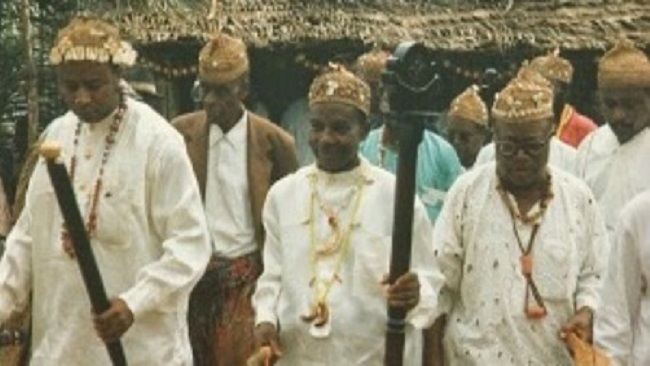Southern Cameroons traditional rulers refuse to return to Ambazonia
Cameroon’s government this week called on hundreds of traditional rulers who have fled separatist conflict areas to return, assuring them that the palaces, markets, schools and roads destroyed by separatists would be reconstructed. But the traditional rulers have refused, saying they are still threatened by fighting between government troops and anglophone rebels.
Deben Tchoffo, governor of Cameroon’s English-speaking northwest region, said by messaging application from the regional capital Bamenda that the government will ensure the rulers’ protection from separatist fighters from the moment they return.
“They should not be afraid. Instead of running, they should come back to face the realities,” Tchoffo said. “The population are there, eagerly waiting, longing to see them. Some of them have gone [been out of their palaces] for many years. They are awaited on the spot. We are there, and we are there to secure them. Whatever will happen, we are there to stand by them, to support them and accompany them.”

This week, Cameroonian Prime Minister Joseph Dion Ngute said the government had raised $14 million of the $150 million it needs for the reconstruction of 350 schools, 115 hospitals, 40 bridges, 400 wells and water taps, 600 kilometers of rural roads, 45 markets and 17,000 private homes he said were destroyed by separatists fighting to create an English-speaking state in the majority French-speaking country. Ngute called on traditional rulers who had fled for safety to French-speaking towns to return to their villages.
Fon Lekunze, traditional ruler of the Mundani tribe of the English-speaking southwestern Lebialem district, who has been in Yaoundé for two years, said by telephone that peace has yet to return to the English-speaking regions. He said several of his peers were attacked when they returned home in July to preach peace, and are still threatened by fighters via social media and by telephone.
“We have implored traditional diplomacy to sensitize populations to shun away from violence and embrace development, and we have used the dialoguing method by pleading with our children [rebels], and we are very hopeful that calm is going to return as soon as possible,” he said.
It is only when that calm returns that they will be assured that their lives will be spared by separatist fighters, he added.
Accusations against chiefs
Traditional rulers started fleeing English-speaking regions when they were accused by separatists of supporting the military and disclosing their hideouts to troops. At least nine were killed and dozens abducted and freed only after ransom was paid. Two dozen palaces were partially or totally torched. Some chiefs were accused by the military and arrested for supporting the separatists.
Jonathan Baye, a historian at the University of Yaoundé, said the chiefs need to assure their populations, separatist fighters, and the military of their neutrality before they can be safe in their villages.
“The chiefs should give confidence about their neutrality because it is usually on those things that they are attacked or they are accused,” Baye said. “They should begin by making their people to know that they [the people] can count on them [the chiefs]. They should begin by creating this confidence.”
‘Bumpy road’ ahead
Jean Luc Stalon, Cameroon representative of the United Nations Development Program, who was invited to the ceremony to launch reconstruction of the English-speaking regions, said the initiative is a good one, but that it will be difficult to carry out with bloody clashes still rampant between the military and rebels.
“We know it is going to be a bumpy road rebuilding social cohesion, rebuilding the local economy that has been damaged by the crisis, to facilitate access of the population to basic services, education, health, water and so forth,” Stalon said. “It is not going to be easy to implement this program in those two regions.”
Separatists on social media have insisted that the reconstruction will not take place unless the central government in Yaoundé withdraws its troops from the English-speaking regions and organizes what they describe as sincere dialogue.
The separatists have been fighting since 2017 to create an independent, English-speaking state in Cameroon’s western regions. The conflict has cost Cameroon more than 3,000 lives and displaced more than half a million people to French-speaking regions or neighboring Nigeria, according to the U.N.
Source: VOA






